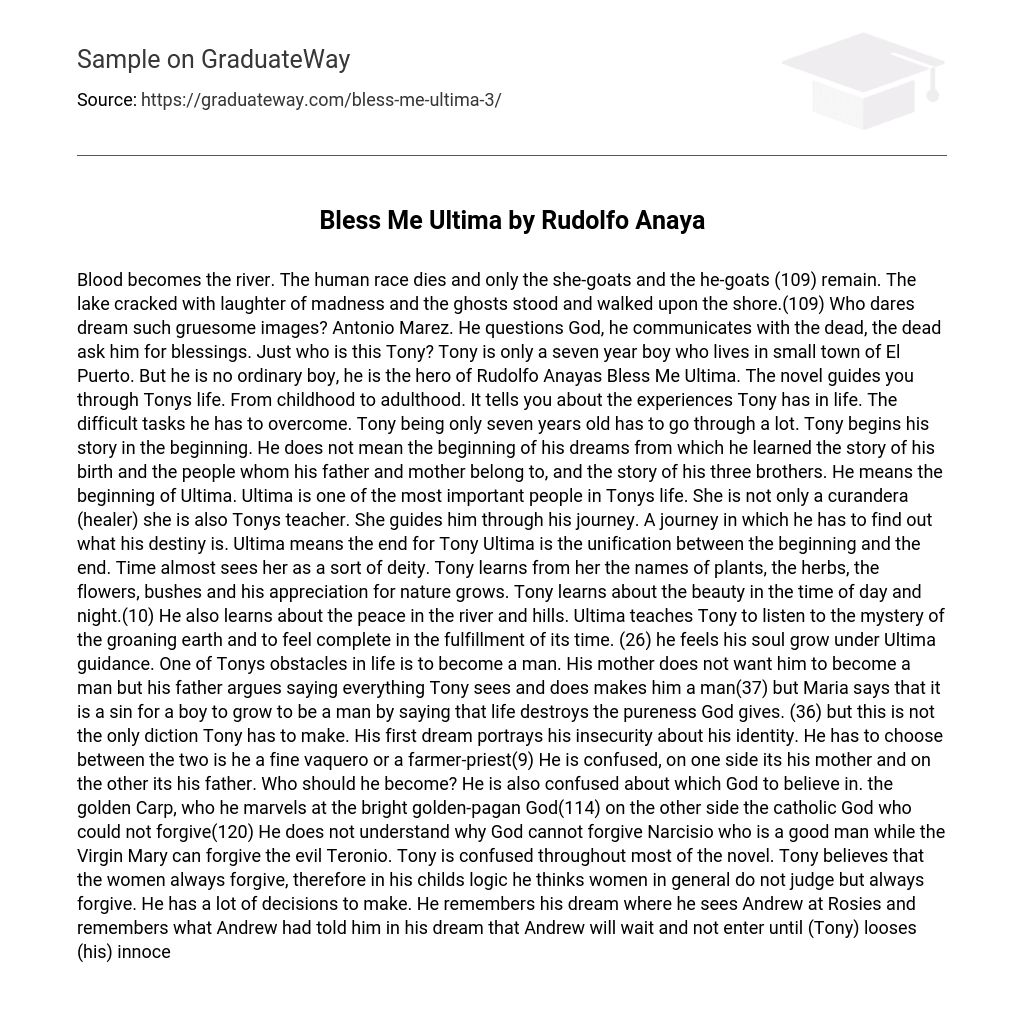Blood turns into a river. The human race perishes, leaving only the she-goats and the he-goats (109). The lake bursts into laughter of insanity and the spirits rise and stroll along the shore (109). Who has the audacity to envision such horrifying pictures? Antonio Marez. He defies God, converses with the deceased, and receives requests for blessings from them. So, who exactly is Tony? Tony is simply a seven-year-old boy residing in the small town of El Puerto. However, he is no ordinary child; he is the protagonist of Rudolfo Anaya’s Bless Me Ultima.
The novel recounts Tony’s journey from childhood to adulthood, detailing his life experiences and the challenges he must overcome.
At the age of seven, Tony faces numerous challenges as he embarks on his journey. He shares his story, starting not at the beginning of his dreams, where he learned about his birth, his parents, and his three brothers. Instead, he refers to the beginning of Ultima.
Ultima holds great significance in Tony’s life as both a curandera (healer) and his teacher, providing guidance throughout his journey of self-discovery and understanding his true purpose.
Ultima represents both the end and the beginning, acting as a unifying force. Time, in a way, regards her as a divine figure. From Ultima, Tony acquires knowledge about various plants and develops a stronger connection with nature. He discovers the splendor found in different times of the day and night, as well as the tranquility present in rivers and hills.
Ultima instructs Tony on the importance of attuning himself to the enigmatic rumblings of the earth and finding solace in the fulfillment of its cycles. (26) With Ultima as his guide, Tony feels his soul flourish. Among the challenges he faces in life is the task of transitioning into manhood. Although his mother opposes this progression, his father counters by asserting that every experience and action Tony encounters contributes to his maturation. (37) Conversely, Maria asserts that it goes against divine principles for a boy to mature into a man, as it takes away from the purity bestowed by God.
(36) However, Tony has more decisions to make than just this. His initial dream reflects his uncertainty about his identity. He must decide between being a respected vaquero or a devoted farmer-priest. This dilemma arises from his conflicting parental influences, with his mother on one side and his father on the other. Tony is also unsure about which deity he should place his faith in.
Tony is perplexed by the contrasting beliefs of the golden Carp, a pagan deity that he admires for its brilliance (114), and the Catholic God, who he believes is unable to forgive (120). He finds it puzzling that God cannot forgive Narcisio, who is a good person, while the Virgin Mary can forgive the wicked Teronio. Throughout the novel, Tony remains confused. He assumes that women, in general, do not judge and are always forgiving, based on his simplistic understanding as a child. Tony is faced with many choices and must grapple with his shattered belief in eternal innocence (45) when his mother informs him that innocence only exists when one lacks knowledge. In his dream, Tony recalls seeing Andrew at Rosie’s and remembers Andrew’s statement that he will wait until Tony loses his innocence (85).
(72) Tony is unwilling to sacrifice his dreams in order to gain understanding, which his father explains is obtained through experiencing life and ultimately entails having compassion for others.(119) He often wrestles with the uncertainty of whether or not he has lost his innocence, and he must seek the answers himself. From Ultima, Tony discovers a love for the enchantment of the vast, untamed earth (105), while his mother teaches him that people are composed of and connected to the land that sustains them. His father imparts the belief that true immortality lies in the freedom of humanity (87), and that such freedom thrives when exposed to the expansive beauty of the land, air, and pristine sky.
(86) Tony bears a certain resemblance to the innocence portrayed by Jem and Scout in Harper Lee’s To Kill a Mockingbird. Both novels explore personal growth, as Tony strives to grasp his true purpose and Jem and Scout learn the importance of understanding others’ actions and not judging based on appearances. Tony’s character exhibits three distinct traits throughout the novel.
He is brave, precocious and often confused, which makes Tony incredibly unique. Unlike most seven-year-olds, he possesses a remarkable spiritual perspective and thinks on a higher level of mental development.
Even in his dreams, Tony’s spirituality is evident. However, Tony is a significant character to examine in the novel because he addresses various profound and ordinary social ideas.





